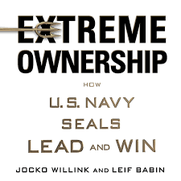 I first heard about Jocko from Tim Ferriss's podcast episode with him. I just finished reading his first book and really liked it: Extreme Ownership: How U.S. Navy SEALs Lead and Win by Jocko Willink. In some ways it reminded me of No Easy Day by Mark Owen, which I had read a while ago, also about lessons learned by a Navy SEAL, though Jocko's is much more about the application of the lessons to leadership in general and business. The book was well written and had lots of great examples of its ideas, both on the combat side and the business side. Many of his ideas resonated a lot with me: extreme ownership, admitting blame, and taking responsibility for everything that happens in your world/department/group, and how that attitude trickles down and up around you to affect everyone. I see counterexamples of this all the time, and I like Jocko's no-excuses approach to this. The example from the intro really hit home with me: swapping the leaders of the best and worst performing teams in a competition completely reversed their performance. Leadership matters. I also never knew there was so much process, paperwork, and PowerPoint in the military. And I see how that illustrates his idea of "leading up" the chain of command and how discipline around process creates freedom. This was a really great book and very inspiring. I definitely look forward to checking out his other books. My main notes and takeaways are below. Preface
All about teams Intro: combat leaders dilemma Part 1; leading the war within 1 extreme ownership Leader in the end responsible for anything and everything At each level this mindset trickles down across organization Can’t blame others Credit given to subordinates Can never blame others when things go wrong Accept blame and see what you can do better for all aspects 2 no bad teams, only bad leaders Enforce standards Swapping leaders of Best and worst teams swaps performance Winning attitude, constant search for improvement. Believe winning is possible. 3 believe To convince others, leader must be true believer in the mission Ask questions up the chain to understand why and then explain to those lower than you why Make it clear to subordinates they should ask you questions 4 check the ego Giving feedback about someone else’s mistake: say you were wrong in not explaining clearly and now need to explain so other’s mistake doesn’t happen again Part 2 laws of combat 5 cover, move One team covers, the other moves Communicate and work together between teams Overall mission is the priority Form relationships with others and see how you can help them and have them help you Work together with subsidiary companies 6 simple Complexity compounds issue Communicate orders clearly and concisely 7 prioritize and execute Relax, look around, and make the call One thing at a time Communicate the priority 8 decentralize command Small teams of 4-6 People can’t manage more than 6 or so people Need clear chain of command so all know who’s in charge Part 3 sustaining victory 9 plan Be clear on mission Plan for all contingencies Detailed mission briefs and operation orders Disciplined planning procedures 10 leading up and down chain of command Explain strategic impact of operations to troops Explain how lower level troop’s role contributes to overall success Push understanding up to leaders above you so they know your situation Invite senior execs out into field for you 11 decisiveness amid uncertainty Be comfortable with decisions in chaos Don’t just wait and see 12 discipline equals freedom Discipline to get out of bed when alarm goes ok Only way to make time is to wake up early Discipline around standard operating procedures Discipline is the pathway to freedom Calm but not robotic One person not more important than mission
0 Comments
Your comment will be posted after it is approved.
Leave a Reply. |
Archives
June 2024
Categories
All
Subscribe |
 RSS Feed
RSS Feed
